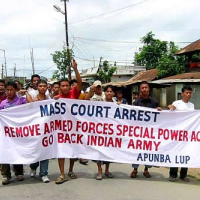Armed Forces (Special Powers) Act: Time for a Review
 Protests in Manipur following the killing of Manorama in 2004 (photo: e-pao.net)
Protests in Manipur following the killing of Manorama in 2004 (photo: e-pao.net)
The Modi administration has made it clear that it will not modify the infamous Armed Forces (Special Powers) Act. Yet a decade after the alleged rape and murder of Thangjam Manorama Devi in Manipur by the paramilitary force Assam Rifles, no one has been convicted for a crime that shocked the nation. On the 10th anniversary of her death, the time has come for a review of the law that allows the Army to shoot to kill and gives blanket immunity from prosecution to paramilitary forces for all crimes, including rape.
On July 11, 2004, a dozen soldiers stormed Manorama’s home and allegedly tortured her before taking her away. Her body was found the next morning with several bullet wounds, including on her genitalia. Forensic tests detected semen and bloodstains on her clothes. Assam Rifles claimed she had been shot while trying to escape.
The widespread protests that followed forced the state administration to institute an inquiry led by Justice Upendra. In his 2010 report, he blamed the security forces for excesses and indicted the Assam Rifles. Yet the paramilitary force challenged the validity of this commission of inquiry, arguing that since they were governed under a special act, only the Centre could set up a commission, not a state government. Meanwhile, the Upendra report has never been made public and remains sealed.
"Neither the PM nor the Home Minister, nor the Defence Minister has made the report public and told the women of Manipur what are the findings of the commission that was appointed by the government itself," Colin Gonsalves, counsel for Manorama's family, told CNN-IBN.
AFSPA was enacted in 1958 to help security forces combat insurgency in Manipur and other northeast states. It was later applied to Jammu & Kashmir in the 1990s.
Human rights activists have for years called for a repeal of the law. Christof Heyns, the United Nations special rapporteur on extrajudicial, summary or arbitrary executions, noted in a 2013 report to the UN Human Rights Council that AFSPA provides security forces with powers “broader than that allowable under a state of emergency as the right to life may effectively be suspended.”
It is also a cover for sexual crimes. In the past decade, 20 instances of rape and sexual assault by security forces have been reported in Manipur, but there has not been a single conviction.
"The AFSPA is directly responsible. Security forces feel they are gods in Manipur, they have absolute immunity," Gonsalves said.
In January 2013, a three-member commission charged with reviewing laws against sexual crimes in India called for a review of AFSPA. The panel, headed by former Chief Justice of India, Justice J S Verma, observed that the "impunity of systematic sexual violence is being legitimised by the Armed Forces Special Powers Act."
The panel said there is an immediate need to review the continuance of AFSPA in certain states as soon as possible. It also recommended posting special commissioners for women's safety in conflict areas.
Yet any attempt to modify or repeal the law is routinely blocked by the military establishment. On July 14, Army Chief General Bikram Singh claimed that AFSPA helps the Army operate in "an asymmetric environment where you cannot differentiate between a friend and a foe as the terrorist merges with the backdrop and hides amongst the locals."
Unfortunately for Manorama and other common people in “disturbed areas”, the foe is often not the “terrorist” but the man in uniform.
The Army should – for its own sake as a professional fighting force – support a review of AFSPA to bring in a law more in line with a modern democratic India, rather than stick with an authoritarian law that provides cover for its soldiers to rape and kill.
- Top Stories
- Controversies
- Where is the Money Going?
- India and the World
- Appointments and Resignations
- Unusual News
- Latest News
- India College Chain’s Expansion into U.S. Draws Opposition from Massachusetts Officials over Quality of Education
- Milk Shortages in India Tied to Release of New Movies Featuring Nation’s Favorite Stars
- Confusion Swirls around Kashmir Newspaper Ban in Wake of Violent Street Protests
- Polio-Free for 5 Years, India Launches Vaccine Drive after Polio Strain Discovery
- New Aviation Policy Could Increase Service, Lower Ticket Prices





Comments
moreless